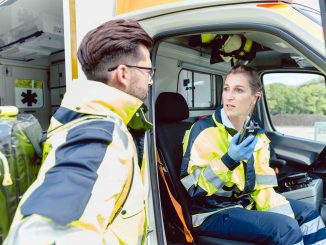
In the late 20th century, the aviation industry recognised a positive correlation between aircraft accidents and co-pilots failing to challenge captain-made decisions. Realising that steep-authority gradients in teams engendered human error and compromised safety, the aviation industry implemented Crew Resource Management (CRM) training.
CRM addresses human factors that contribute to team dysfunction and thus, risk (i.e., situational awareness, decision making, teamwork, leadership, coping with stress and fatigue management education).
Understanding that training alone would not change industry-entrenched authoritarian culture, aviation also implemented procedural disciplinary measures when captains failed to listen or act upon the safety-concern of a team member.
Such changes have allowed aviation to forge a mature culture in which transparent reporting and learning from error is a retributive-free norm.
Unlike aviation, paramedicine remains married to unsafe authoritarian gradients. Numerous factors affect a person’s position within the hierarchy of a team. In paramedicine, these include (but are not limited to) sex, gender identity, personality, age, cultural background, job title and an individual’s unregulated control of another’s career prospects.
The authority gradients that these realities breed deter paramedics from raising patient-safety concerns. Additional lack of substantial CRM training, non-standardised or non-transparent reporting systems, risk of post-reporting retribution and ‘blame culture’ further preclude human-factor mitigation.
I was reminded of our industry’s lingering obsession with hierarchical divide when delivering human-factor education to a class of qualified paramedics. The lesson’s purpose was to discuss the relationship between patient safety and flattened authority gradients/team inclusivity. The take home message: medical error can be avoided if all team members feel safe to voice perspective and concern.
I illustrated this concept by using the example of resuscitation cessation being a team-decision. I was not prepared for the backlash I received from a leading paramedic class member: ‘NO. If I am at a job and I want to cease resuscitation, it will be my call to make as the senior person.’
In that moment, I was transported to a case from my past. Newly qualified; first on scene at a traumatic cardiac arrest. Simultaneous arrival of multi-disciplinary personnel was followed by quick planning. Absence of patient injuries incompatible-with-life propelled my advocacy for patient extrication and clinical reversal of potentially reversible arrest causes. Extrication was undertaken; resuscitation commenced. A senior paramedic crew arrived; one member requested resuscitation cessation. My concern regarding this decision was dismissed. Senior personnel promptly departed. I was left to debrief with all on scene: police, fire personnel and the twenty-odd civilian bystanders who required psychological care and active link-ins with health professionals in lieu of what they’d witnessed.
My place as the ‘junior’ paramedic was to do as I was told. Presenting an alternate opinion (even if that opinion was patient advocacy driven by evidence base and currency of practice) was out-of-line because historically, one cannot appear to oppose senior instruction. Post case, it was recommended that I avoid submitting risk-management paperwork.
Over-dominating clinicians, also known as ‘toxic captains’, yield dysfunctional teams. ‘Toxic captains’ tend to not invite or hear team opinion, a reality that propagates human error and generates poor patient outcome.
A safe healthcare entity ensures strongly voiced senior colleagues do not silence junior employees, and they champion mechanisms for blame-free reporting. All paramedics can and should speak up if they have any patient-care concerns, without fear of retribution.
The human condition renders us fallible. Health care professionals regularly make mistakes. We will never be perfect. We can, however, limit human-error induced patient harm by creating a safety-fuelled culture reflective of aviation.
HOW TO IMPLEMENT GRADED ASSERTIVENESS


Article first published in Rasa Piggott’s regular column “On The Frontline” in the Australian Emergency Services Magazine, Vol 24, Issue 3, 2021.





